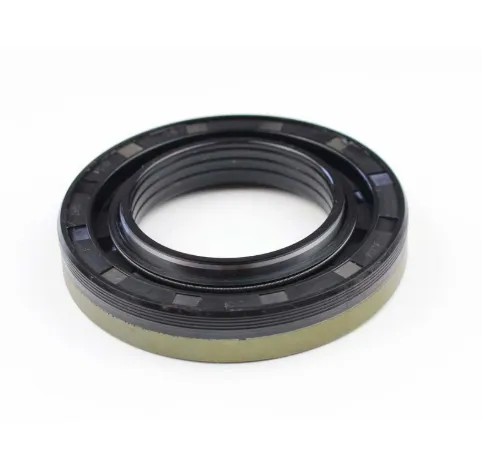Cassette Seals: Durable Sealing Solutions for Harsh Environments
Utangulizi
In demanding industrial and automotive applications, sealing components must offer durability, reliability, and resistance to contamination. Cassette seals are one such innovation, specifically designed to withstand harsh environments such as off-road machinery, agricultural equipment, and heavy-duty trucks. Unlike standard seals, cassette oil seals are multi-lip systems housed in a protective shell, offering extended service life and reduced maintenance. This article explores the function, structure, and benefits of cassette seals, highlights their applications, and provides insights into choosing the right cassette seal catalog and trusted cassette seals manufacturer.

What Is a Cassette Seal and How Does It Work?
A cassette seal is an advanced type of radial shaft seal composed of multiple sealing lips integrated within a single enclosed unit, or “cassette.” These seals are specifically engineered for use in environments with extreme contamination, heavy mechanical loads, and variable rotational speeds.
The main components of a seal cassette include:
Primary sealing lip: Keeps lubricant inside the system.
Dust or dirt exclusion lips: Prevent the ingress of contaminants like dirt, water, and mud.
Reinforced metal case: Protects the sealing elements and simplifies installation.
Cassette seals are designed to work seamlessly with rotating shafts, ensuring a tight seal while reducing shaft wear. They also distribute pressure evenly across the sealing lips, improving durability compared to conventional oil seals.
These features make cassette oil seals ideal for applications in:
Agricultural machinery (tractors, harvesters)
Construction equipment (excavators, loaders)
Heavy-duty vehicles (trucks, trailers)
Mining and forestry equipment
Because they are pre-assembled and self-contained, cassette seals reduce installation errors and maintenance requirements, making them an efficient solution in complex systems.
Advantages of Cassette Oil Seals Over Traditional Seals
The use of cassette oil seals has grown steadily due to their superior performance in contaminated or high-load environments. Their key benefits include:
- Enhanced Contamination Resistance
Multiple exclusion lips effectively prevent dirt, water, and other external particles from entering the system. This is especially critical for machinery operating in muddy, dusty, or wet conditions.
- Longer Service Life
The design of a cassette seal distributes pressure evenly and reduces wear on both the seal and shaft, significantly increasing its lifespan. This leads to fewer replacements and reduced downtime.
- Shaft Protection
Standard oil seals may cause grooving or damage to the shaft over time. Cassette oil seals often come with a built-in wear sleeve, which protects the shaft surface and extends its operational life.
- Ease of Installation
Being pre-assembled, seal cassette units are easier to install and reduce the chance of incorrect fitting. They are less sensitive to installation mistakes and shaft misalignment.
- Versatility
These seals are compatible with grease or oil lubrication systems and are suitable for both rotational and oscillating movements.
Due to these benefits, cassette seals have become a preferred solution for OEMs and maintenance professionals across various industries.
Choosing the Right Seal: Catalogs and Manufacturers
Selecting the right cassette oil seal involves matching the seal’s design and specifications with the application’s demands. This is where a comprehensive cassette seal catalog becomes essential.
- Using a Cassette Seal Catalog
A cassette seal catalog provides detailed information on:
Seal dimensions (inner diameter, outer diameter, width)
Lip configurations and materials (nitrile, FKM, PTFE)
Application types (axle seals, hub seals, etc.)
Operating conditions (temperature, speed, pressure)
Reputable manufacturers offer downloadable or printed catalogs that allow users to search for compatible seals by OEM part numbers, dimensions, or application type. These catalogs ensure accuracy and help prevent costly installation mistakes.
- Selecting a Cassette Seals Manufacturer
A reliable cassette seals manufacturer is key to getting high-quality sealing solutions. Consider the following when choosing a supplier:
Experience and reputation: Established manufacturers with a global presence and industry certifications (ISO/TS standards) tend to offer consistent product quality.
Customization options: Some applications may require custom designs or special materials for high temperatures or chemical resistance.
Technical support: Look for manufacturers who provide engineering support, compatibility checks, and guidance on installation and maintenance.
Availability: Choose a manufacturer with a wide distribution network and readily available stock to reduce lead times.
Examples of well-known cassette seals manufacturers include SKF, National Oil Seals (Timken), Trelleborg, and Corteco, but there are also many reliable regional and OEM-specific suppliers.
In environments where standard oil seals might fail, cassette seals offer superior performance, durability, and ease of installation. Whether you're browsing a cassette seal catalog for replacements or sourcing from a reputable cassette seals manufacturer, understanding the structure and benefits of these advanced sealing solutions is key to maintaining reliable machinery operation. From protecting vehicle axles to safeguarding agricultural equipment, cassette oil seals are a smart investment for any system that requires long-lasting, high-performance sealing under tough conditions.
-
Seal 12x20x5: Precision Radial Shaft Seals for Industrial Reliability
Habari Nov.24,2025
-
Seal 12x18x5: Essential Guide to Specifications, Applications & Vendors
Habari Nov.24,2025
-
Understanding Seal 12 20 5: Applications, Specifications & Industry Insights
Habari Nov.23,2025
-
Durable Oil Seal 85x110x12 – Reliable Sealing Solutions for Industry
Habari Nov.23,2025
-
Durable and Precise Oil Seal 75x95x10 for Efficient Machinery | YJM Seal
Habari Nov.22,2025
-
Durable Oil Seal 75x100x10 for Reliable Industrial Performance | YJM Seal
Habari Nov.22,2025
-
High-Quality Oil Seal 65x90x10 | Durable & Reliable Sealing Solutions
Habari Nov.22,2025
Kategoria za bidhaa















